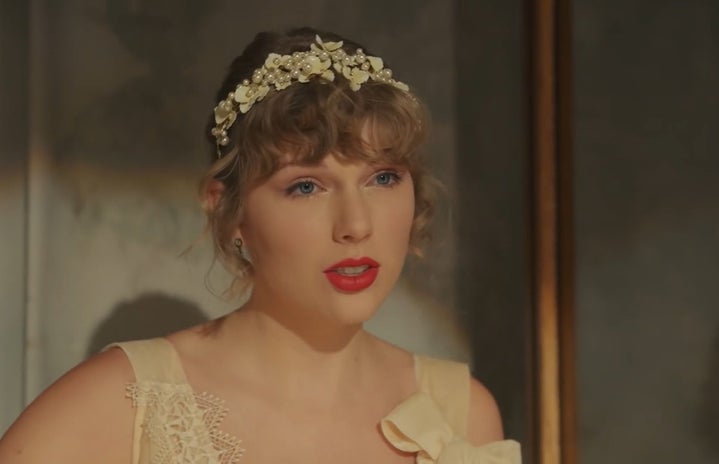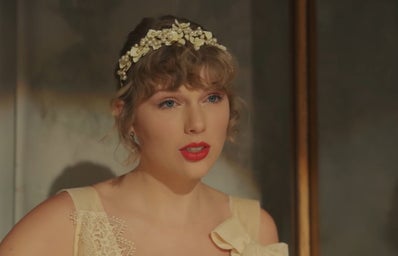Taylor Swift’s discography is full of literary references, but there is no song in her canon that stands out quite like “Love Story.” I confess, it has been several years since I’ve listened to this song, but with the release of “Love Story (Taylor’s Version),” it has become a staple in my playlists again. “Love Story” made my literary heart so happy, but also very confused because these references have some pretty significant differences from the original work, “Romeo and Juliet.” However, there are other references that also create this cacophony of lyricism. If you don’t pay careful attention to the words, you might miss it.
The plot of “Love Story” is a retelling of Shakespeare’s tragedy “Romeo and Juliet.” Spoiler alert for one of the most famous plays in the English language, but “Romeo and Juliet” ends with the death of the two titular characters and reconciliation of the feuding families, the Capulets and the Montagues. Unlike Shakespeare, Swift ends her story with an engagement singing “He knelt to the ground and pulled out a ring, and said/ Marry me, Juliet, you’ll never have to be alone/ I love you, and that’s all I really know/ I talked to your dad, go pick out a white dress/ It’s a love story, baby, just say ‘Yes’.”
Ironically enough, most of Shakespeare’s comedies like “A Midsummer Night’s Dream” or “Twelfth Night” also end with a wedding or marriage as a central part of the play. Swift changing the ending of “Romeo and Juliet” loses a lot of the significance of the original play. What’s a tragedy without some tragic moments? However, it also gives Swift’s characters their own autonomy and her song more originality than just a recycled version of “Romeo and Juliet.”
It’s also interesting to note that reimagining old stories was actually a trademark of Shakespeare’s plays. Even his version of “Romeo and Juliet” is based on a poem called “The Tragical History of Romeus and Juliet” by Arthur Brooke. Just like Swift, Shakespeare also significantly changed the meaning of source material in his retelling.
Swift’s interpretation of the ending may be a complete deviation from the original plot, but the rest of the song is a mainly accurate retelling. In Swift’s version, the couple also meet a party, there’s a balcony scene, parental disapproval and a secret meeting between the star-crossed lovers—even though her pair doesn’t share the same tragic fate.
“Romeo and Juliet” is not the only literary reference that appears in “Love Story.” In the pre-chorus, Swift sings “Cause you were Romeo, I was a scarlet letter.” This references the character Hester Prynne in Nathanial Hawthorne’s novel, “The Scarlet Letter.” In the novel, Hester Prynne is ostracized by her Puritanical community after she has an affair with Rev. Dimmesdale. Hester is forced to wear a scarlet letter ‘A’ pinned to her clothing to represent her adultery. It was basically the fifteenth-century version of slut shaming.
Why does Taylor Swift include this symbol? It seems disjointed to the narrative in the rest of the song. Maybe this is just a clunky mixed metaphor, but I like to think that Taylor is a little smarter than that. After all, she references “The Scarlet Letter” in her later song “The New Romantics” where she sings “We wait for trains that just aren’t coming/We show off our different scarlet letters/Trust me, mine is better.” One theory about the reference in “Love Story” is that Swift is trying to allude to her Juliet as being off-limits to Romeo, forbidden to pursue romantic happiness in the same way that Hester was forbidden from being with Rev. Dimmesdale. Swift has never made a direct statement about this lyric, so it is completely up to the interpretation of the individual listener.
Personally, I have to respect Taylor Swift for making such bold songwriting choices. At first, it is easy to assume that Taylor is just a confused teenage girl, but what she’s doing is actually very original and, in some ways, even follows in the footsteps of Shakespeare. “Love Story” can be viewed as a precursor to the intricate and advanced lyricism that has come to define Swift as a singer/songwriter. Taylor Swift is able to take a story that is often placed on a pedestal and can seem out of reach, especially to teenagers, and make the struggles of Romeo and Juliet accessible to a wider audience. She has taken a timeless story and made it feel modern whether it’s 2008 or 2021.



